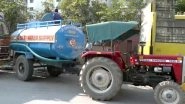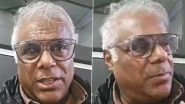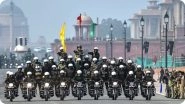Damascus, December 8: The Syrian government collapsed early Sunday, falling to a lightning rebel offensive that seized control of the capital of Damascus and sent crowds into the streets to celebrate the end of the Assad family's 50 years of iron rule.
Syrian state television aired a video statement by a group of men saying that President Bashar Assad had been overthrown and all prisoners had been set free. Assad Regime Falls: Syrian Rebels Take Control of Television Centre in Damascus, Video Surfaces.
The man who read the statement said the opposition group, known as the Operations Room to Conquer Damascus, called on all rebel fighters and citizens to preserve the institutions of “the free Syrian state.”
The statement emerged hours after the head of a Syrian opposition war monitor said Assad had left the country for an undisclosed location, fleeing ahead of insurgents who said they had entered Damascus following a remarkably swift advance across the country.
Many of the capital's residents were in disbelief at the speed at which Assad lost his hold on the country after nearly 14 years of civil war that killed hundreds of thousands of people, displaced half the country's prewar population of 23 million and drew in several foreign powers. Assad Regime Falls: PM Mohammad Ghazi Al-Jalali Calls for Peaceful Transition of Power After Rebel Forces Overthrow Bashar al-Assad-Led Government in Syria (Watch Video).
Celebrations Erupt Across the Capital
As daylight broke over Damascus, crowds gathered to pray in the city's mosques and to celebrate in the squares, chanting “God is great.” People also chanted anti-Assad slogans and honked car horns. Teen boys picked up weapons that had apparently been discarded by security forces and fired them in the air.
Revellers filled Umayyad Square in the city center, where the Defense Ministry is located. Men fired celebratory gunshots into the air and some waved the three-starred Syrian flag that predates the Assad government and was adopted by the revolutionaries. A few kilometers (miles) away, Syrians stormed the presidential palace, tearing up portraits of the toppled president.
Soldiers and police officers left their posts and fled, and looters broke into the Defense Ministry. Videos from Damascus showed families wandering into the presidential palace, with some emerging carrying stacks of plates and other household items.
“I did not sleep last night, and I refused to sleep until I heard the news of his fall,” said Mohammed Amer Al-Oulabi, 44, who works in the electricity sector. “From Idlib to Damascus, it only took them (the opposition forces) a few days, thank God. May God bless them, the heroic lions who made us proud.”
Syria's al-Watan newspaper, which was historically pro-government, wrote: “We are facing a new page for Syria. We thank God for not shedding more blood. We believe and trust that Syria will be for all Syrians.” The newspaper added that media workers should not be blamed for publishing government statements in the past.
“We only carried out the instructions and published the news they sent us,” it said. “It quickly became clear now that it was false.” A statement from the Alawite sect — to which Assad belongs and which has formed the core of his base — called on young Syrians to be “calm, rational and prudent and not to be dragged into what tears apart the unity of our country.”
Assad's Whereabouts are Unknown
Syrian Prime Minister Mohammed Ghazi Jalali said in a video statement that the government was ready to “extend its hand” to the opposition and turn its functions over to a transitional government. He later told Saudi television network Al Arabiya that he does not know where Assad and the defense minister are. He said he lost communication with Assad late Saturday.
Rami Abdurrahman of the Syrian Observatory for Human Rights told The Associated Press that Assad took a flight Sunday from Damascus. A senior diplomat from the United Arab Emirates, which had sought to rehabilitate Assad's image and has welcomed high-profile exiles in recent years, declined to comment on his whereabouts when asked by reporters at a conference in Bahrain.
Anwar Gargash said Assad's destination at this point is a “footnote in history,” comparing it to the long exile of German Kaiser Wilhelm II after World War I. Assad has been accused of war crimes and crimes against humanity during the war, including a 2013 chemical weapons attack on the outskirts of the capital.
There was no immediate comment from Iran, which had been Assad's staunchest supporter. The Iranian Embassy in Damascus was ransacked after apparently having been abandoned. AP footage showed broken windows and documents scattered in the entryway.
Entry Into Damascus Caps Lightning Advance
Opposition forces had not reached Damascus since 2018, when Syrian troops recaptured areas on the outskirts of the capital following a yearslong siege. The night before, opposition forces took the central city of Homs, Syria's third largest, as government forces abandoned it. The city stands at an important intersection between Damascus, the capital, and Syria's coastal provinces of Latakia and Tartus — the Syrian leader's base of support and home to a Russian strategic naval base.
The rebels had already seized the cities of Aleppo and Hama, as well as large parts of the south, in a fast-moving offensive that began Nov. 27. The advances in the past week were by far the largest in recent years by opposition factions, led by a group that has its origins in al-Qaida and is considered a terrorist organization by the United States and the United Nations. In their push to overthrow Assad's government, the insurgents, led by the Hayat Tahrir al-Sham group, or HTS, have met little resistance from the Syrian army.
Calls for an orderly transition as it remains unclear what comes next
HTS set up a “salvation government” in 2017 to administer a large region in northwestern Syria under its control. In recent years, HTS leader Abu Mohammed al-Golani has sought to remake the group's image, cutting ties with al-Qaida, ditching hard-line officials and vowing to embrace pluralism and religious tolerance.
“Golani has made history and sparked hope among millions of Syrians," said Dareen Khalifa, a senior adviser with the International Crisis Group and an expert on Syrian groups. "But he and the rebels now face a formidable challenge ahead. One can only hope they rise to the occasion.”
The UN's special envoy for Syria, Geir Pedersen, called Saturday for urgent talks in Geneva to ensure an “orderly political transition.” Russian Foreign Minister Sergey Lavrov, whose country is Assad's chief international backer, said he feels “sorry for the Syrian people.”
The Gulf nation of Qatar, a key regional mediator, hosted an emergency meeting of foreign ministers and top officials from eight countries with interests in Syria late Saturday. The participants included Iran, Saudi Arabia, Russia and Turkey.
Majed bin Mohammed al-Ansari, Qatar's foreign ministry spokesman and an adviser to the prime minister, told reporters that they agreed on the need “to engage all parties on the ground," including the HTS, and that the main concern is “stability and safe transition.” The Israeli military said Sunday it has deployed forces in a demilitarized buffer zone along its northern frontier with Syria following the rebel offensive there.
The military, which said it also sent troops to “other places necessary for its defense,” said the deployment was meant to provide security for residents of the Israeli-annexed Golan Heights. Israel captured the territory in the 1967 Mideast war and the international community, except for the United States, views it as occupied.













 Quickly
Quickly


